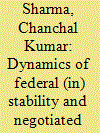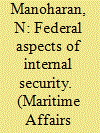| Srl | Item |
| 1 |
ID:
190170


|
|
|
|
|
| Summary/Abstract |
Many studies have demonstrated a trend towards greater centralization of the federal system in India since 2014. However, the causal mechanisms that underpin this centralization remain underexplored. This article systematically explores the processes involved in tipping the delicate federal balance in favour of greater central control, and in doing so pays particular attention to the role of the party system therein. Our analytical narrative is structured around the assertion that ‘negotiated cooperation’ is contingent upon: (a) the interaction between constitutional structure and federal politics; (b) the capacity and willingness of subnational incumbents to safeguard their policy space and (c) the nature of party organization and the ideological disposition of the polity-wide parties towards territorial power-sharing. Drawing from India’s experience since 1952, we demonstrate that a dominant party system does not necessarily entail encroachment on subnational authority. At the most, it is a necessary but insufficient condition for federal imbalance. However, the problem of federal encroachment arises only when the dominant party is internally centralized and personalized, advocates unitarism and operates in a context of weak constitutional, political, procedural and judicial safeguards for self-and shared-rule. India under the leadership of Indira Gandhi, but more recently of Narendra Modi, comes close to meeting these conditions.
|
|
|
|
|
|
|
|
|
|
|
|
|
|
|
|
| 2 |
ID:
133673


|
|
|
|
|
| Publication |
2014.
|
| Summary/Abstract |
The characteristics of Indian federalism are unique. The uniqueness is conspicuous by its dual character: "federal during normal times, but unitary in times of war". The study examines how such a federal set-up impinges on India's internal security management, including maritime and coastal security. Despite being in a stronger position constitutionally, the Centre has not been assertive. Finding out various reasons for the Union's hesitancy, the study advocates a stronger role for the Centre in internal security issues. The main reason being the threat matrix to India's internal security is such that it is beyond the capability of the States of India to counter them on their own, effectively. After analysing various constitutional and legal aspects of internal security, the study makes some key recommendations. It advocates the need for the Centre and the States to combine their efforts instead of blaming each other for internal security problems. "Cooperative Federalism" instead of "Competitive Federalism" is the suitable way ahead.
|
|
|
|
|
|
|
|
|
|
|
|
|
|
|
|